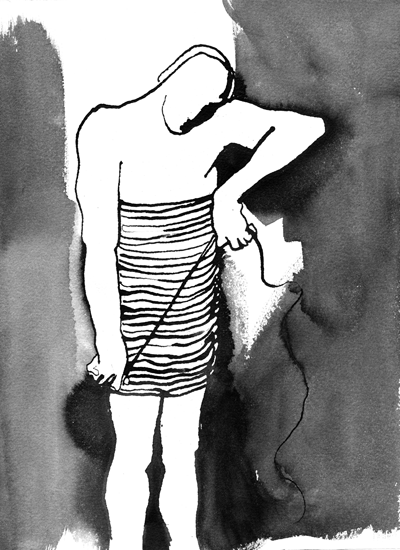Over the past few years, I have taken to photographing women. This is an interesting switch from being their astrologer, but I bring at least one thing with me—I like to listen as much as I like to look. Just about everyone I’ve photographed has spent a couple of hours sharing their story and their ideas about life.
As you may imagine, I hear many interesting things from women I’ve photographed in countries across Europe and North America, and I am beginning to gather their stories in something called The Book of Blue.
Recently, I visited my favorite land in High Falls with Leigh, one of the models I photograph for this project. It was sunny and warm for a winter day, but still chilly. I wasn’t expecting her to work nude, but she has a Capricorn Sun and Moon—she’s winter’s child, confident and present in the world.
Determined to make good pictures, she peeled off her layers and stripped down to a thin pair of sweats. In the photographs, I blended details of her body into the magnificent winter landscape till the goose bumps took over. Noticing them vividly through my lens, I suggested she get dressed. In those 15 minutes, we got some earthy photos of an earthy girl.
Then we wandered around the woods for a bit. I spontaneously started collecting bits of kindling from tree branches, and suggested we make a fire. This we did, and sat in the cold January sunlight for hours next to the flames and slow-rising smoke, eating Five Fruits Lifesavers and talking about everything that came up.
This of course included sex. After we had gone far enough into the discussion to appreciate the complexity of our subject, she said some words that fairly well stunned me and would have been cheered at any human potential workshop in the 1970s, long before she was born—“It’s not about sex. It’s about self.”
What she had observed, mainly through observing herself, is that when you follow sexual awareness into yourself, you’re taken to the core of self-awareness. The psyche in its deepest layers is so closely intertwined with sexual consciousness as to be one and the same with it. Because it accounts for how we come into the world, which is the only world we know, sex is cosmic. Yet discussion of sex is a kind of ruse for the real discussion, below the surface, and that is about one’s sense of identity and existence.
This makes sense. Assuming they are not cloning people yet, we all come into existence through sex or at least sex cells. Half of us starts as a sperm cell that experiences an orgasm and then takes a big ride on an ejaculation, carried along in an ocean of whatever feelings are present. The sperm cell who became us personally went up to that enormous egg (our other half) and kissed it, surrendering its prior form and identity into a new entity. That is how our existence begins, and that memory is, I would imagine, directly in our DNA, along with the instructions for how to do it again.
Sex is what creates us, so it’s sensible that eroticism (that is, all the feelings we have about sex) will have the potential to carry our creative impulse into life, and throughout our lives.
It also works the other way. When someone is conditioned to either not think or experience sexuality with full awareness (or any awareness), or if they are programmed to respond with guilt and fear, self-awareness becomes blocked. If there is a sexual injury or the perception of one, it can block much of our creative energy, potential, and happiness.
Our relationship to sex and sexuality is our relationship to existence. If we feel good about our erotic experiences, needs and feelings, we tend to feel good about life. If we are bitter, if we don’t get what we need, if we feel guilty or ashamed of our sexual feelings and experiences, that is most likely how we’re going to feel about life. This can manifest in some strange ways, such as violence and manipulation, just like feeling good about sex can manifest as a passionate, creative person who creates their existence consciously every day.
Why don’t we see the connection? Well, we’re conditioned not to, principally by religion. Notice that this thing we call religion takes credit for our existence at the same time it makes sex bad. You also can’t be aware of something you cannot feel, have no experience with or don’t know exists. For 25 years, Americans have grown up with something called abstinence-only sex indoctrination, which in effect denies the existence of their natural sexuality (Europeans who know about this think we’re on crack).
Our biology does not give up so easily, though. The psyche’s hunger for sex (which is the hunger to fully exist), for a while, pushes through this resistance. What we find then is often a lot of programmed people who themselves fall for the deception, and it can become very difficult to get our needs met. Honesty can be met with rejection. Wanting anything unusual can be met with a weird look. Even equating sex with deep vulnerability, such as in a relationship, is frequently avoided. How often do we have the feeling that someone is just not going as deep as they can, not calling themselves present?
Imagine, then, all the thought and discussion we have about sex and issues that stem from it—and substitute the word “self.” Imagine the need, the fear, the anxiety, the desire, the deep craving, the judgments we fear and the ones to which we’ve fallen prey. Imagine everything ever said in a church sermon. Imagine the jealousy and the drama and the secrets. Imagine everyone we’ve ever fucked or wanted to. Imagine sex education, the birds and the bees, masturbation and all of those orgasms. Imagine all those sexual relationships wherein we tried to find our self.
Replace the concept “sex” with “self” and see how the world looks through that lens. How would it feel if somebody said to you, “Hi, I really want to have self with you”?
Or, translated: “I really want to be myself with you, and have you be yourself with me.”
Locked-In Syndrome
The other night at Upstate Films, I saw a film called The Diving Bell and the Butterfly. It’s the true story of a man named Jean-Dominique Bauby, once a prominent writer and editor in Paris. At the age of 42, at the peak of his success as editor in chief of Elle, he suffered a massive brainstem stroke, losing all mobility and sensation except for his hearing and the use of his left eye.
He could think; he could see; he could hear. His memory and imagination were intact. But he could not move or express himself—except for one eye. This is called “locked-in syndrome.” It is consciousness locked into a body that cannot respond; it is the ultimate mind-body split.
I think that, sexually, we are a society of people suffering from a variant of locked-in syndrome. We may have our erotic imaginations, we may have our memories and we may have our desires. But we have untold thousands of reasons not to act on or even speak about our experiences. To some extent, nearly everyone in the current version of Western culture is erotically paralyzed.
We can have liberal values, but are often trapped in groups of people who don’t share them or don’t reveal it if they do. We can have progressive ideas about relationships, but are only able to find people who have traditional values, or with those who seek some freedom but who don’t speak up.
We might be locked inside of fear, of insecurity, or the cocoon of lies that we have told in the past—or, more probably, the lies that we were told. We might be trapped inside fat, or the feeling of being ugly or undesirable.
We might have ideas, images and feelings, but lack the words and concepts to express them: trapped in a kind of seemingly imposed silence. This silence can come with the feeling that we will be struck down if we dare to open up and speak.
We might be trapped inside a sense of vulnerability so acute it feels like walking around a city naked. For many, this would translate to being naked in the winter.
Some are trapped inside a sense of injury from a sexual assault, incest experience, or growing up around shifty boundaries as a kid.
We might be trapped inside a wall that was put up when we were told that masturbation is wrong.
Or trapped in the inability to ask for what we want.
Trapped inside of any version of the mind/body split—“caught in one’s head.”
Trapped inside of embarrassment, unable to speak or even feel because of the shame associated with doing so.
Trapped inside of being gay when everyone thinks you’re straight or straight when everyone thinks you’re gay.
Trapped inside of being bisexual when the people around you just don’t get it.
Trapped in a monogamous relationship when we’re really polyamorous.
Trapped inside the need to be in love, otherwise being unable to express sexuality.
Trapped inside an image we must maintain, of wanting to seem pure and upright.
Trapped inside of pride; a closely related theme.
Trapped inside religious conditioning, even if we don’t think we have it.
Trapped inside of tradition or family expectations.
Trapped inside of not knowing what we want. Trapped inside of a lot of people telling us what we are supposed to want, even though they have no clue.
Trapped inside of not trusting people. Trapped inside of not trusting ourselves.
Trapped inside the feeling that we don’t exist.
Trapped inside a parent telling us we’re ugly, even once.
Trapped inside of having been raped or molested, and having had that wound fester.
Trapped inside a myth of what monogamy is supposed to be, even if we know it’s not that thing.
Trapped inside not being able to find a lover, or a sex partner.
Trapped inside of seeking the perfect person, and not letting anyone else in.
Trapped inside of feeling “dirty” and terrified of being found out.
And on, and on.
I think that in many ways, though we are walking around, many of us here are in considerably worse shape than Bauby. He at least was fully conscious of being alive. He was able to write a book communicating by blinking his one eye. Most of us are far less articulate about our erotic and emotional needs than this.
I would ask: Where are we going to learn? Where is the place that the conversation is welcome? If it’s not about sex, where is the place that you can really be your self?
Continued next month.
An expanded version of this series is available at www.planetwaves.net.



















